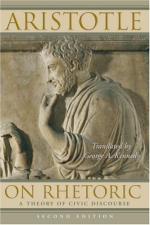
|
| Name: _________________________ | Period: ___________________ |
This quiz consists of 5 multiple choice and 5 short answer questions through Book II, Chapters 23-26.
Multiple Choice Questions
1. How did Aristotle define calmness?
(a) The same as normal.
(b) The same as boredom.
(c) The opposite of excitement.
(d) The opposite of anger.
2. Which cause of human action did Aristotle mention as always being unpleasant?
(a) Appetite.
(b) Compulsion.
(c) Habit.
(d) Anger.
3. What explanation of justice did Aristotle provide?
(a) A well intentioned set of actions.
(b) A well intentioned action.
(c) A means between three extremes.
(d) A mean between two extremes.
4. As both illustrations and fables utilized imagery to make a point, what type of imagery did Aristotle think fables used?
(a) Relevant.
(b) Fantastic.
(c) Irrelevant.
(d) Realistic.
5. What types of examples did Aristotle discuss in Book II, Chapter 20?
(a) Actual facts and hypothetical facts.
(b) Actual facts, hypothetical facts, and invented facts.
(c) Actual facts and invented facts.
(d) Hypothetical facts and invented facts.
Short Answer Questions
1. How did Aristotle define a maxim?
2. According to Aristotle, what was the general difference between enthymemes and examples?
3. What did Aristotle think was irrelevant to the feeling of indignation?
4. Based on Aristotle's explanation of the wealthy, how did wealthy people view the opinions of others about money?
5. In the beginning of the book, which one of the following did Aristotle indicate about rhetoric?
|
This section contains 317 words (approx. 2 pages at 300 words per page) |

|




